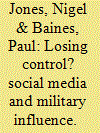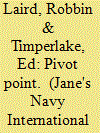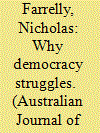| Srl | Item |
| 1 |
ID:
175663


|
|
|
|
|
| Summary/Abstract |
After WWII, Japan established a unique system of civil–military relations and civilian control of its Self-Defense Forces (JSDF), characterised by bureaucratic rather than political control. For more than half a century, military influence on defence policymaking had been comparably low, depriving political leaders of a critical source of knowledge on national security. Yet, the latter half of the 2000s saw several institutional changes which resulted in the wide-reaching inclusion of military officials in national security policymaking. Why did a democratic Japan, shaped by WWII experiences, see the need for more military influence? The cause for this development ultimately lies within a changing security environment which lends credit to the broader argument that Japan has embraced a ‘realpolitik’ approach to national security.
|
|
|
|
|
|
|
|
|
|
|
|
|
|
|
|
| 2 |
ID:
144187


|
|
|
|
|
| Summary/Abstract |
The recent history of the Middle East is marked by military influence (both direct and indirect) over governance. Lebanon, however, has followed a different trajectory: although it was ruled by army commander General Fuad Shihab between 1958 and 1970, this represented a mediated solution to civil unrest. Here, Eduardo W Aboultaif analyses how the army has helped to preserve stability during periods of crisis, in the 1950s and 2000s, by remaining neutral towards those confessional groups struggling for power – the hallmark of what became known as Shihabism. When it failed to do so in 1975, Aboultaif argues, the armed forces fractured along religious faultlines and the country descended into a vicious, protracted conflict.
|
|
|
|
|
|
|
|
|
|
|
|
|
|
|
|
| 3 |
ID:
122236


|
|
|
|
|
| Publication |
2013.
|
| Summary/Abstract |
Social media are altering the way in which information is shared worldwide in new and unpredictable ways. The uses of social media as tools of military influence, however, are still to be explored. Nigel Jones and Paul Baines analyse the significance of this change for the nature of strategic communication in the twenty-first century.
|
|
|
|
|
|
|
|
|
|
|
|
|
|
|
|
| 4 |
ID:
125642


|
|
|
|
|
| Publication |
2013.
|
| Summary/Abstract |
The strategic pivot toward the Asia-Pacific region is intended to rebalance the projection and focus of US military power in the years ahead. However, it will not be without its challenges.
|
|
|
|
|
|
|
|
|
|
|
|
|
|
|
|
| 5 |
ID:
121664


|
|
|
|
|
| Publication |
2013.
|
| Summary/Abstract |
Since the revolution of 1932 that ended absolute monarchy, Thailand has experienced sporadic military interventions, with 19 coups and coup attempts over those decades. This article explains these military interventions by emphasising the cultural aspects of Thai coup-making at the elite level. Concretely, the article shows that episodic military interventionism-supported by significant and persistent military influence in politics-is now part of a distinctive elite coup culture. In contrast to other so-called 'coup-prone' states, Thailand has largely accommodated military interventionism, especially by accepting the defence of the monarchy as a justification for toppling elected governments. Thailand's reluctance to redemocratise, and the haphazardness of the resulting institutional configurations, suggests that Thailand's elite-and, to some extent, the public as well-have deeply internalised the ultimate acceptability of coups. The test of this arrangement may come with the end of King Bhumibol Adulyadej's reign and the potential realignment of military influence in Thai society.
|
|
|
|
|
|
|
|
|
|
|
|
|
|
|
|